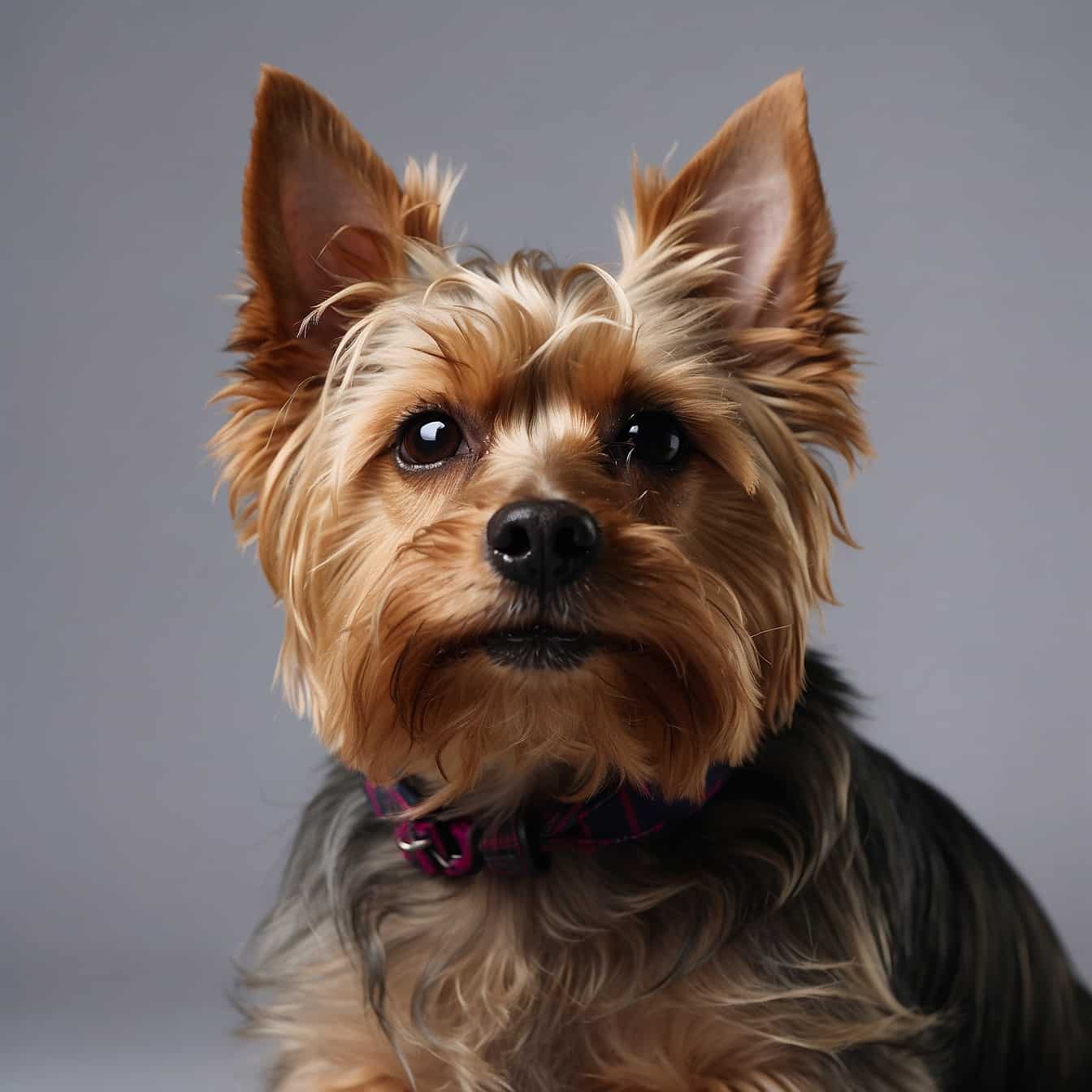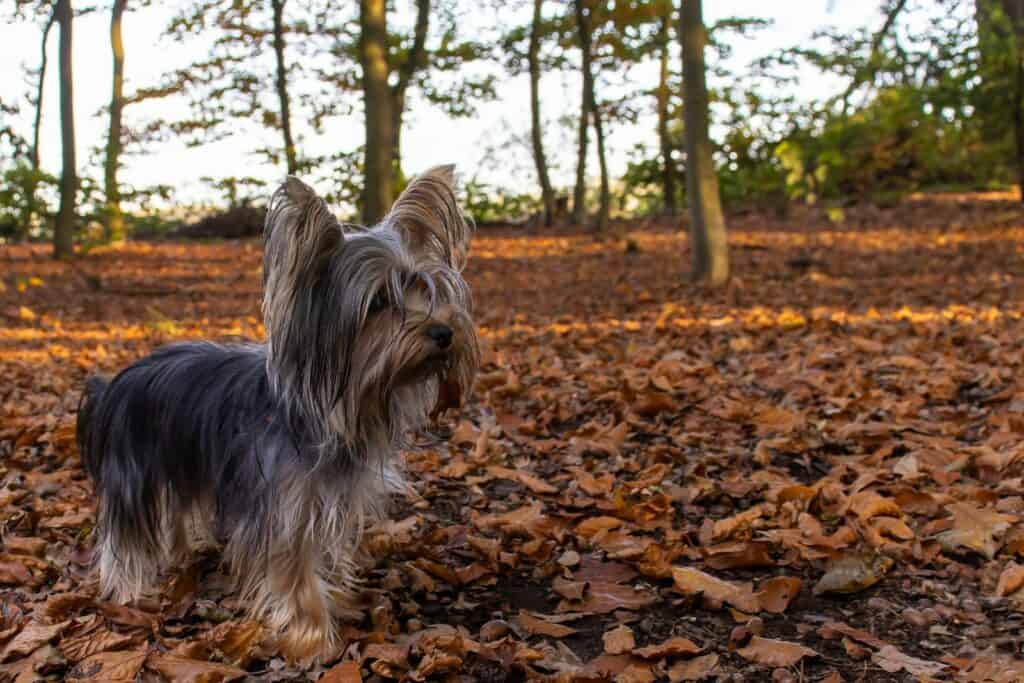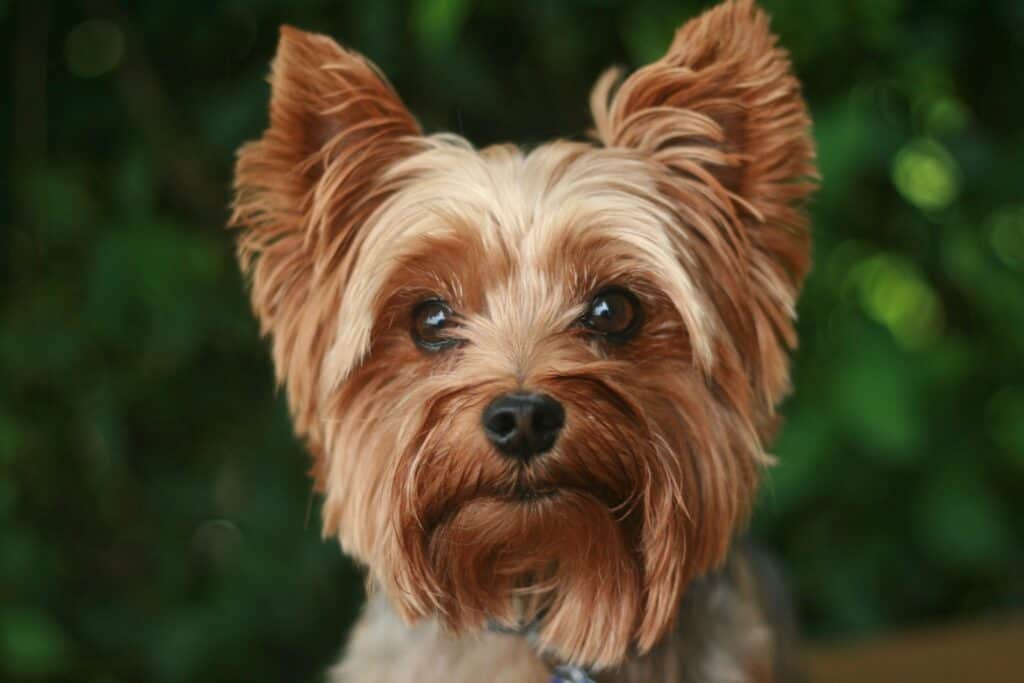Step into the world of Yorkshire Terriers, where elegance meets a pocket-sized package. These small but sophisticated companions have a history as charming as their appearance. Explore their rich heritage, learn about their unique care needs, and discover the endearing traits that make Yorkshire Terriers such beloved pets.

| Category (Explanation) | Breed Information |
|---|---|
| Year of Breed Conception | 19th century |
| Country of Origin | England |
| Weight (lbs & kg) (Male) | 4-7 lbs (1.8-3.2 kg) |
| Weight (lbs & kg) (Female) | 4-7 lbs (1.8-3.2 kg) |
| Coat Type | Silky, straight, and fine |
| Color Variations | Blue and tan |
| Shedding Level (Low, Moderate, High) | Low to Moderate |
| Height (cm & in) | 7-8 inches (18-20 cm) |
| Breed Size | Toy |
| Trainability (Low, Moderate, High) | High |
| Mental Needs (Low, Moderate, High) | Moderate |
| Intelligence Level (Low, Moderate, High) | High |
| Energy Level (Low, Moderate, High) | Moderate |
| Agility (Low, Moderate, High) | Moderate |
| Loyalty (Low, Moderate, High) | High |
| Playfulness (Low, Moderate, High) | High |
| Exercise Needs | Daily walks and playtime |
| Guarding Proficiency (Low, Moderate, High) | Low |
| Sociability with Children (Low, Moderate, High) | Moderate |
| Barking Level (Low, Moderate, High) | High |
| Digging Tendency (Low, Moderate, High) | Low |
| Destructive Behavior (Low, Moderate, High) | Low |
| Drooling Level (Low, Moderate, High) | Low |
| Obedience Level (Low, Moderate, High) | High |
| Apartment Friendly (Yes/No) | Yes |
| Inherent Prey Drive | Low |
| Physical Risk to Others (Low, Moderate, High) | Low |
| Travel Fatality Risk (Low, Moderate, High) | Low |
| Allergen Potential | Low |
| Health Concerns (List of Common Health Concerns) | Patellar Luxation, Tracheal Collapse |
| Average Life Expectancy (Life Expectancy in Years) | 12-16 years |
Woof Mastery is reader supported and our articles may contain affiliate links.
Instead of running third party ads that we have no control of we only use links from high-quality companies we are directly partnered with. Making use of these links come at no cost to you our reader, and in many cases have the extra benefit of discounted rates or sign up bonuses.
If you’re interested you can read more about our affiliate policy here.
We appreciate your support and always insure that the products and services we recommend are high-quality, helpful and relevant to the subject at hand!
The Yorkshire Terrier’s history is one of elegance and charm. Originating in 19th-century England, they were bred as rat catchers in the textile mills of Yorkshire. These small but sophisticated terriers were known for their agility and tenacity, making them perfect for the job. Over time, they transitioned from working dogs to beloved companions of the Victorian elite. Their luxurious coats and spirited personalities endeared them to royalty and high society. Today, Yorkshire Terriers continue to be cherished for their affectionate nature and enduring appeal.

What sets the Yorkshire Terrier apart is its elegant and charming nature. These small-sized dogs are not just adorable but also full of character. Their rich history, which mirrors their appearance, and their unique care needs make Yorkshire Terriers special companions, often bringing a touch of sophistication to their owners’ lives.
Yorkshire Terriers, often referred to as Yorkies, have a history as charming as their appearance. Originating in the rugged landscapes of Yorkshire, England, these small and elegant dogs were originally bred for a practical purpose. Their primary traditional role was to hunt rats and other small vermin in textile mills and coal mines during the 19th century. Their small size and tenacity made them well-suited for this job. Over time, they transitioned from being working dogs to beloved companion animals, bringing their lively and affectionate nature to households around the world.
Yorkshire Terriers are often described as big dogs in small bodies. They are known for their feisty and confident personalities. These terriers are brave, affectionate, and have a strong sense of loyalty to their owners. While they may be a bit independent, they are also known for their spirited and loving nature. With proper socialization and training, they make wonderful, loving companions.
Yorkshire Terriers are known for their affectionate and loyal nature. They often form strong bonds with their families, making them loving companions. However, their small size may lead to a degree of assertiveness, and they can be wary of strangers. Proper socialization can help them become more open and friendly.
Yorkshire Terriers are small and elegant dogs with a silky, straight, and fine-textured coat that comes in a combination of blue and tan. They have a fine-boned, well-proportioned body, with a level back and a straight, delicate tail carried high. Their head is small and flat on top, with a medium-length muzzle, and they have bright, expressive eyes that convey their lively personality. Their ears are V-shaped and stand erect. Yorkies have a confident and alert demeanor, with a sprightly gait, making them a charming and endearing breed.
Yorkshire Terriers typically have a blue and tan coat. The body is primarily blue (steel-blue) with tan markings on the head, ears, chest, and legs. This classic coloration is a hallmark of the breed and gives them a distinctive and elegant appearance.
Yorkshire Terriers, or Yorkies, have a low shedding level. These small dogs with long, silky hair shed minimally, making them suitable for individuals with allergies. Regular grooming is essential to maintain the quality of their coat. Yorkies require daily brushing to prevent matting and tangling, and occasional trims may be necessary. While their shedding is low, proper grooming practices, a balanced diet, and regular veterinary check-ups contribute to the overall health and appearance of the Yorkshire Terrier’s coat. Consistent care helps minimize shedding and keeps their coat in good condition.
Yorkshire Terriers, or Yorkies, have long, silky coats that require regular grooming to keep them in good condition.
Brushing: Daily brushing is recommended to prevent matting and tangling. Use a comb or slicker brush suitable for their coat type.
Bathing: Bathe as needed, typically every few weeks, using a dog shampoo designed for long coats. Rinse thoroughly and dry completely.
Trimming: Regular trims, especially around the eyes and feet, help maintain their appearance. Consult a professional groomer for guidance.
Ears: Check and clean their ears regularly to prevent wax buildup or infections. Use a damp cotton ball or a veterinarian-recommended ear cleaning solution.
Nails: Keep their nails trimmed to a comfortable length for good foot health.
Teeth: Brush their teeth regularly to prevent dental issues and bad breath.
Yorkshire Terriers, or Yorkies, have a moderate activity level. Despite their small size, they are energetic and enjoy playtime and short walks. Providing mental stimulation through interactive toys and training sessions is important for their well-being. Yorkies thrive on companionship and may enjoy engaging in activities with their owners, making them adaptable to various living situations.
Yorkshire Terriers are known for their intelligence, marked by problem-solving abilities, agility, and a desire to please their owners. They are generally trainable and responsive to positive reinforcement training methods. Yorkshire Terriers can learn various commands and tasks. Their agility allows them to excel in roles such as hunting and agility sports. Historically, they were skilled in roles such as hunting and vermin control, showcasing social intelligence by forming strong bonds with their families. While they may not top the charts in terms of obedience, their intelligence makes them excellent companions and working dogs. Training, socialization, and mental stimulation contribute to their well-rounded and obedient nature.
Yorkshire Terriers thrive on mental stimulation. Engage them in activities like puzzle toys, interactive games, and obedience training to keep their minds sharp and prevent boredom.
Social Interaction: They enjoy spending time with their family and need regular interaction. Loneliness can lead to anxiety, so provide companionship and attention.
Exercise: While they are small, regular physical activity is important for their overall well-being. Daily walks and playtime contribute to their mental and physical health.
Enter The Woof Mastery

Before choosing a Yorkshire Terrier, it’s important to recognize their unique needs. These dogs thrive on companionship and may not do well with long periods of solitude. Regular exercise and mental stimulation contribute to their well-being. Grooming their long, silky coat is a significant commitment. Yorkies are known for their intelligence, so early training and socialization are vital. Prospective owners should be aware of potential health concerns and provide regular veterinary care. Creating a loving and engaging environment is crucial to ensuring the happiness and well-rounded behavior of these lively and affectionate companions.
Yorkshire Terriers, with their small size and friendly nature, generally pose a low risk to others. Proper socialization and training contribute to positive interactions. Responsible ownership, understanding individual temperament, and adherence to local regulations play crucial roles in ensuring a well-behaved Yorkshire Terrier.
Yorkshire Terriers are often good with children. They are small in size and can be gentle companions. Supervision is important during play, and positive reinforcement training helps ensure positive interactions. Teaching children how to approach and handle the dog contributes to a positive relationship.
Yorkshire Terriers may not be natural swimmers due to their small size. While some individuals may tolerate water, others may not enjoy it. If you plan to introduce them to water, do so gradually and observe their comfort level. Always prioritize safety and use a canine life vest if needed.
Remember that Yorkshire Terrier puppies, like all puppies, are eager to please and learn. Positive and consistent training practices will help them become well-behaved, obedient, and happy adult dogs. Building a strong and trusting bond with your puppy through training is a rewarding experience for both you and your canine companion.
Yorkshire Terriers (Yorkies) are known for being alert and may bark to alert their owners or express themselves. While they can be vocal, excessive barking is not a common trait. Proper training and socialization contribute to a well-behaved and appropriately vocal Yorkshire Terrier.
Yorkshire Terriers are adaptable to various living conditions, including apartments and houses with yards. They enjoy indoor play but still need daily walks for exercise. Regular grooming is essential for their coat maintenance. Socialization is crucial to prevent excessive barking or aggression. Positive reinforcement training is effective in shaping their behavior.
When traveling with Yorkshire Terriers, prioritize their comfort and safety:
By addressing these considerations, you ensure safe and comfortable travel for Yorkshire Terriers.
Yorkshire Terriers, like many breeds, may be prone to specific health concerns. While not all individuals will experience these issues, it’s essential for Yorkie owners to be aware of potential health problems and collaborate with veterinarians for their pets’ well-being. Common health concerns in Yorkshire Terriers include:
Regular veterinary check-ups, a balanced diet, proper exercise, and responsible breeding practices can help mitigate some of these health concerns. It’s crucial for Yorkie owners to work closely with their veterinarians to monitor their pets’ health and address any issues promptly.
Proper nutrition is essential for the health and well-being of Yorkshire Terriers. Here are some nutritional habits and best practices to consider for this breed:
Breed-Specific Laws (BSL): Yorkshire Terriers are generally not commonly subject to breed-specific laws (BSL) as they are not typically considered a dangerous breed. However, it’s important to note that BSL can vary widely by jurisdiction, and some areas may have restrictions on specific breeds or breed types.
Local Regulations: To determine if there are any breed-specific laws or restrictions regarding Yorkshire Terriers in your area, you should check with your local animal control or government authorities. Be aware of and comply with any local regulations to ensure that you are in compliance with the law while owning a Yorkshire Terrier.
Woof Mastery is reader supported and our articles may contain affiliate links.
Instead of running third party ads that we have no control of we only use links from high-quality companies we are directly partnered with. Making use of these links come at no cost to you our reader, and in many cases have the extra benefit of discounted rates or sign up bonuses.
If you’re interested you can read more about our affiliate policy here.
We appreciate your support and always insure that the products and services we recommend are high-quality, helpful and relevant to the subject at hand!
Myth 1: Yorkies are Fragile and Need to be Handled with Extreme Care
Myth 2: Yorkies Don’t Need Exercise
Myth 3: They are High-Maintenance Grooming Dogs
Myth 4: Yorkies are Not Good with Children
Myth 5: They are Yappy and Bark Constantly
Myth 6: Yorkies are Indoor Dogs Only
Myth 7: They are Not Intelligent
Myth 8: Yorkies Don’t Need Socialization
Myth 9: They are All the Same in Temperament
Myth 10: Yorkies Don’t Have Health Concerns
Understanding the realities of Yorkshire Terriers helps potential owners provide the best care for these small yet resilient companions.
Famous Yorkshire Terrier owners include:
Matt Damon: The actor Matt Damon has been known to have a Yorkshire Terrier as a pet. Yorkshire Terriers are appreciated for their small size and affectionate nature.
The Yorkshire Terrier is culturally significant as a small but spirited breed that has captured the hearts of dog enthusiasts worldwide. Known for their long, silky coat and confident personality, Yorkies have become popular as both companions and show dogs. Their presence in popular media, including films and advertisements, has contributed to their recognition and cultural appeal. Yorkshire Terriers are symbols of elegance and charm, finding a special place in the homes of those who appreciate their lively nature.
The Yorkshire Terrier, known for its small size and luxurious coat, gained popularity in the 19th century. While there may not be a single most famous historical owner, Yorkies were favored by celebrities and individuals who appreciated their elegance and charm.
Yorkshire Terriers, known for their small size and confident demeanor, face challenges that include:
The Yorkshire Terrier, commonly known as the Yorkie, is believed to have been developed in England, particularly in the region of Yorkshire. The contributing breeds may include:
Yorkshire Terriers, with their elegant appearance and spirited personality, make charismatic family companions. Known for their loyalty and adaptability, they integrate well into family life. Their long, silky coat and petite size add to their charm. Yorkshire Terriers thrive on companionship and engage actively in play. With proper training and socialization, they become devoted members of the family, bringing grace and a touch of sophistication to the household.